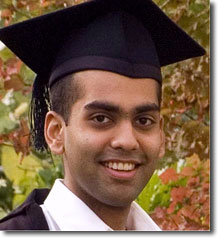OCHS Scholar Pauses for Thought on BBC Radio

Gopal Gupta
Tuesday, 11 March 2003
In between studying for his upcoming D.Phil. on illusion, OCHS student Gopal Gupta has been recording for BBC Radio's Pause for thought.
Pause for thought is a daily fixture on BBC Radio Two's morning programme which brings a couple of minutes of thoughtfulness to millions of Britons getting ready for the day ahead.
The OCHS has always encouraged this kind of public space engagement by students and staff, bringing a meaningful bite of Indian thought to modern audiences.
The shows can be heard on Wednesday mornings from 28 March to 2 May.
Repeats can be heard at www.bbc.co.uk/radio2/shows/wake-up-to-wogan/pause-for-thought/ or on the BBC's Iplayer website www.bbc.co.uk/iplayer/
And a taste of Gopal's thought...
Triumph over Adversity
Good Morning! Many of you may have just awoken from a good or bad dream. Throughout history, poets and philosophers have been intrigued by the possibility that life as a whole might be a dream. The dream and waking life are similar in many respects, for in both dreaming and waking, the objects of our experience are temporary and fleeting, even though we are convinced that they are real.
In the history of Western philosophy, this point was extensively discussed by Plato. In the dialogue Theaetetus, Socrates asks, 'What proof could you give that at the present moment we are talking with each other in a waking condition and our conversation is not a dream?' Theaetetus admits that their own discussion could be something they are imagining in their sleep. Socrates concludes, 'So you see, it is even open to dispute whether we are awake or in a dream.' According to Plato, no one can ever prove that they are not dreaming. Plato believes that only when a person realizes that he or she is, in fact, dreaming, does one truly become awake.
Similar to Plato, Bhagavad-gita, India’s ancient spiritual classic, portrays the human condition to be like that of a person in a dream-state. We go through this life like a person who is asleep. We do things without asking why; we act in the way that society expects us to. In Bhagavad-gita, Krishna tells us that the core of our problems is that we’ve forgotten who we are. We’re spirit souls Krishna says, that resides in the temporary body. When we wake up and realize who we truly are, that is enlightenment that allows us to triumph over any adversity that comes our way.
Thus, India’s sages appeal to their readers in the following ways: tamasi ma jyotir gamaya, 'Do not stay in darkness, come to the light,' uttistha, 'Get up!' and jagrata, 'Become awakened.'
